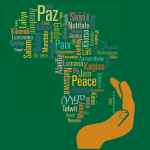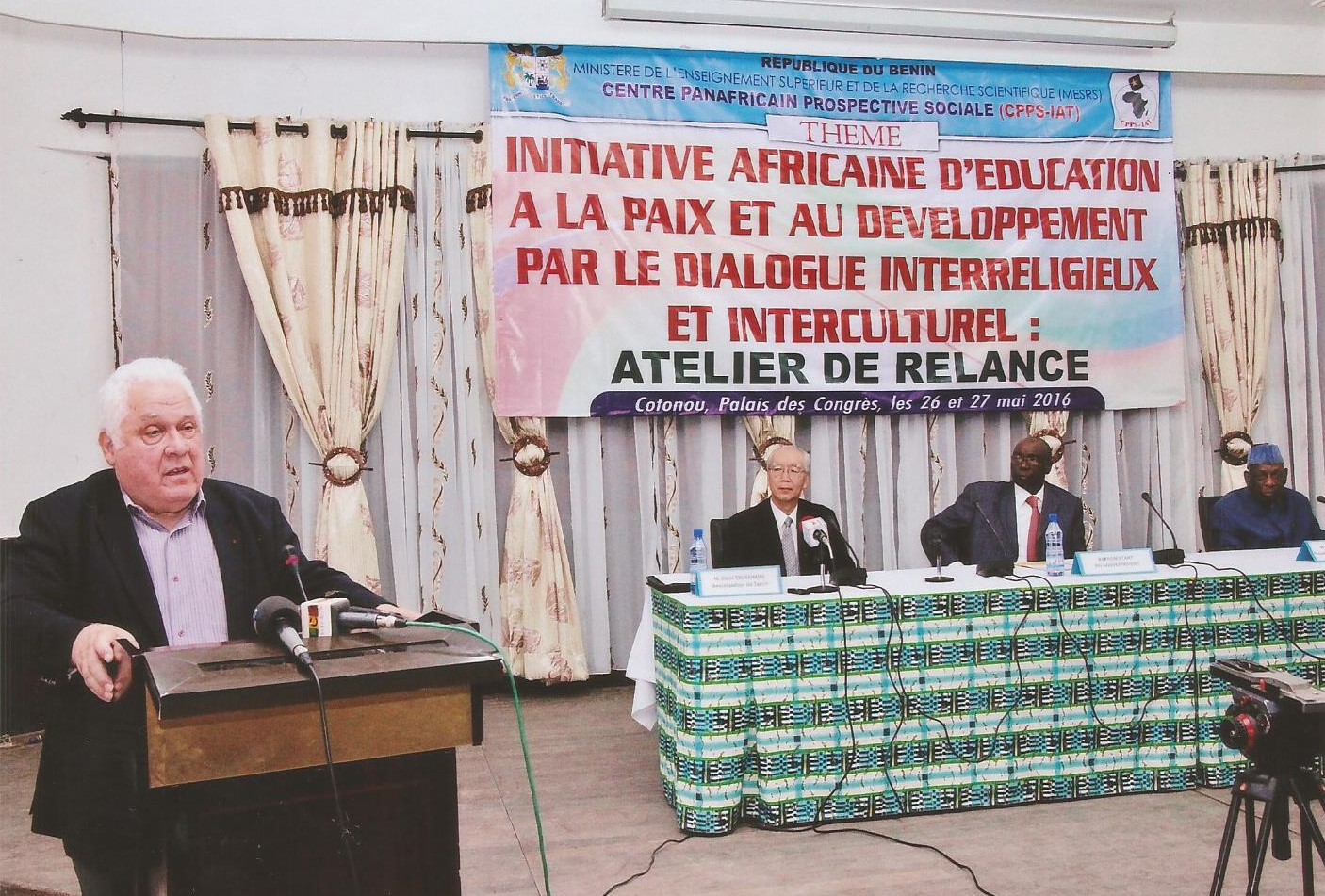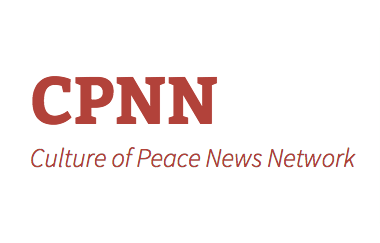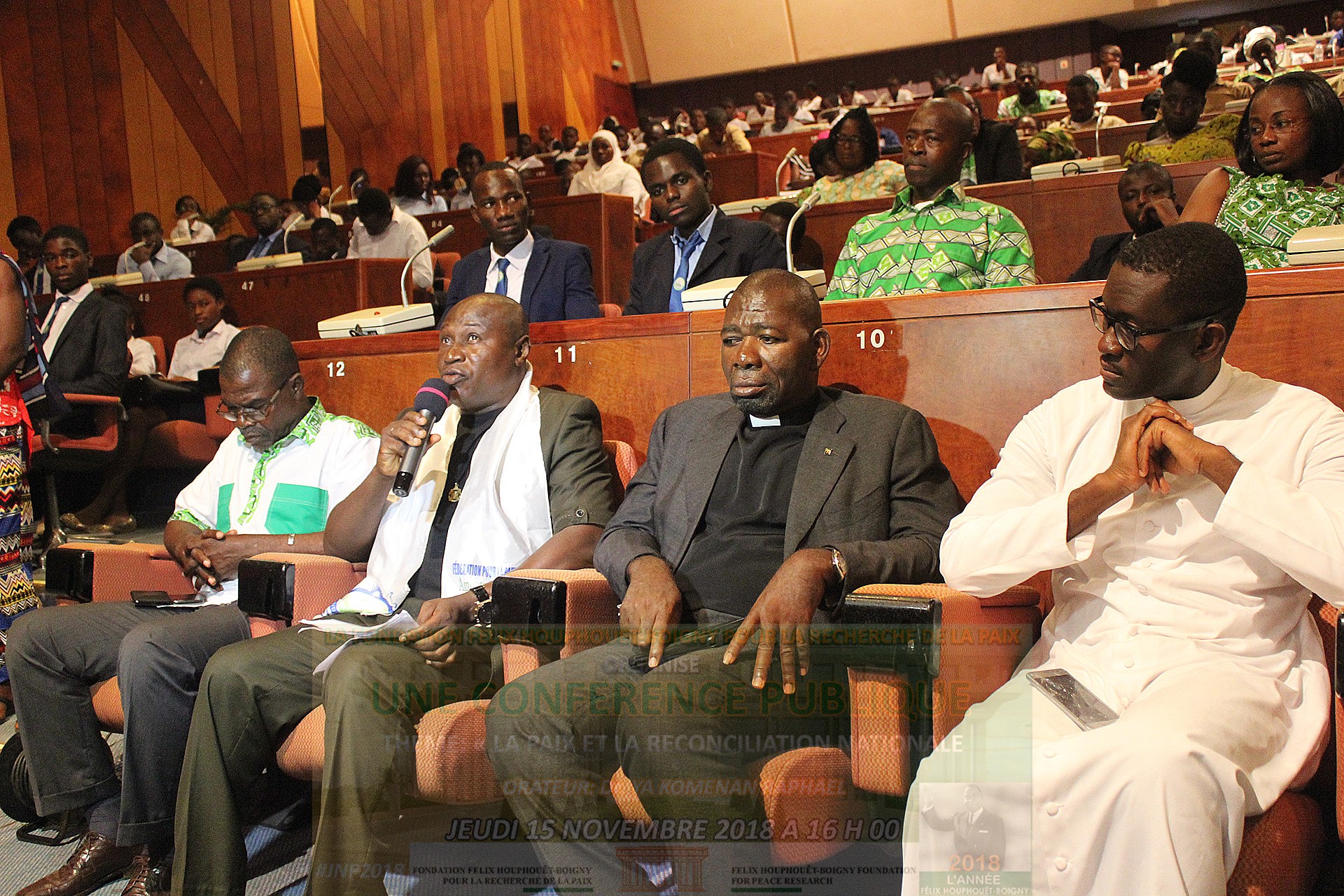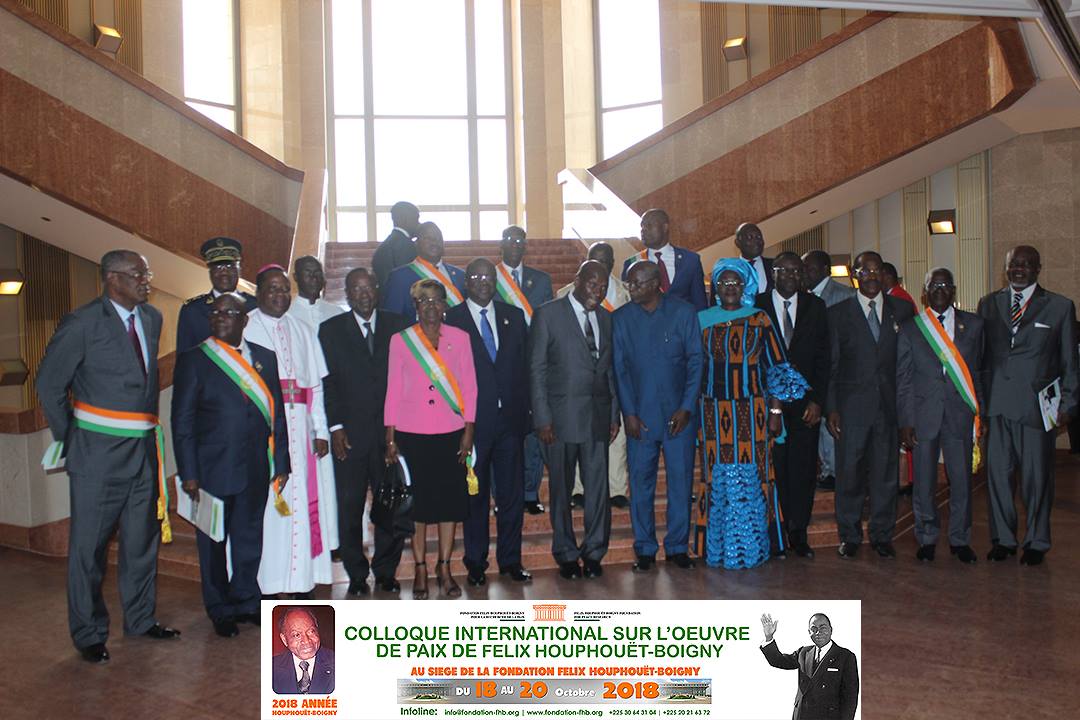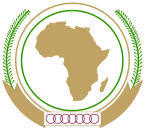-
Welcome to the
Network of Foundations and Research Institutions for the Promotion of a Culture of Peace in Africa
-
The Network's Meetings
News
Recovery workshop on the theme: “African Initiative for Education for Peace and Development through Religious Dialogue” Organized by the Pan-African Center for Social Prospects (CPPS-IAT) on May 26 and 27, at the Cotonou Convention Center in Benin
Organized in Cotonou from May 26 to 28, 2015, the International Symposium on the launching of the African Initiative for Education for Peace and Development through Inter-religious and Intercultural Dialogue is once again in the news. On May 26 and 27, 2016, a workshop was held at the Cotonou congress center to review the modalities of the official start of the second edition.
This meeting of great importance was initiated by the President of the Pan-African Center for Prospective Social (CPPS-IAT), Professor Albert Tévoédjrè, attended by several personalities. At the opening of the meeting, the Chair of the CPPS-IAT clarified that the purpose of this workshop was to harmonize views and modalities for better financing of the project. He returned to the manifesto published after the launch of the project in 2015, which received a good rating from international organizations. "It is time to say if this manifesto has produced effects. We want this workshop to deliver a program that will allow international funding institutions to bring their perspectives to bear on what will be composed, "he said. This meeting benefited from the effective participation of the Benin government through its Minister of the Interior, Sacca Lafia, and other personalities from Burkina Faso, Togo, Côte d'Ivoire and others. This demonstrates their concern for the maintenance of peace in Africa and in the world. He particularly addressed his thanks to the Togolese and Ivorian heads of State, Faure Gnassigbé Eyadéma and Alassane Dramane Ouattara, who worked for the sustainability of this initiative, not to mention the Japanese government for the granting of a sum of two million to support the initiative. "It is not a government project but a people's project, we want an international network to support what we want to do and we need people to help us in this reform, he concluded.
CPNN (Culture of Peace News Network) bulletin of May 1, 2016
NONVIOLENCE IS MAKING HISTORY
Nonviolence is in our news these days. Let us begin by recalling the words of the great tactician of nonviolence, Martin Luther King, speaking of Mahatma Gandhi: "nonviolent resistance is not a method for cowards; it does resist. If one uses this method because he is afraid or merely because he lacks the instruments of violence, he is not truly nonviolent. This is why Gandhi often said that if cowardice is the only alternative to violence, it is better to fight… nonviolent resistance … is not a method of stagnant passivity… For while the nonviolent resister is passive in the sense that he is not physically aggressive toward his opponent, his mind and his emotions are always active, constantly seeking to persuade his opponent that he is wrong. The method is passive physically but strongly active spiritually. It is not passive non-resistance to evil, it is active nonviolent resistance to evil."
Perhaps the most active practitioner of this approach today is the Nonviolent Peaceforce. They have recently been nominated for the Nobel Peace Prize in recognition of their teams "on the ground" in the various "hotspots" around the globe. In addition, they are actively trying to convince the United Nations and various governments to adopt nonviolence as a paradigm shift: "One of the most dramatic shifts will have taken place when everyone realizes that, the assumption that an armed actor will not yield to anything except a weapon has been proven to be untrue."
All of this is part of the long-term strategy announced recently by Nonviolent Peaceforce: "We protect civilians in violent conflicts through unarmed strategies. We build peace side by side with local communities. We advocate for the wider adoption of these approaches to safeguard human lives and dignity."
Another major practitioner of nonviolence is the Mennonite Central Committee, which recently publicized initiatives in seven countries on four continents.
Meanwhile, Pax Christi and other activists recently convened a meeting at the Vatican to enlist the Catholic Church in the approach of nonviolence, requesting that the church reverse its support for "just wars."
We should also mention the Nonviolence Charter which has now been signed by 104 organisations from 33 countries, as well as the new initiative that we mentioned last month for nonviolent cities.
In celebrating Earth Day this month, the Campaign Nonviolence reminds us that to protect our planet we need to live "nonviolently" with such practices as sustainability, renewable energy, lowering meat consumption, and supporting local food.
One of the major tactics of nonviolence is mediation. Recently, we have featured articles on the training of police for mediation, as well as specific initiatives in Mexico and Bolivia.
These initiatives may not be featured in the headlines of the commercial media, where violence is considered more newsworthy, but in the long run the initiatives for nonviolence are making history, while violence is only impeding it.
CPNN (Culture of Peace News Network) bulletin of March 1, 2016
THE STRUGGLE OF AFRICA
There is an epic struggle for the heart of Africa between the forces of the culture of war and those of the culture of peace. On the one hand, attacks by Boko Harem, Al Qaida, ISIS, and Al-Shabaab get the headlines in the commercial media, not to mention potential for civil war in Burundi and the fratricidal war in Southern Sudan, On the other hand, if the many recent articles in CPNN about initiatives for the culture of peace are an indication, it is the culture of peace that is gaining!
African Union: Burundi agrees to accept African Union human rights monitors
African Union: 26th Ordinary Session of the AU Assembly concludes with gratitude to Ebola fighters and peace as priorities of the continent
African Union: Retreat of the Pan-African Network of the Wise
Senegal: The feminist Bineta Diop: United against war in Africa
Tunisia: Appeal for massive particiption in the first international meeting on education for peace
Cameroon: Community radio in the service of peace education
Morocco: Muslims Advance Consensus for Citizenship for All: The Marrakesh Declaration
Mali: Elaboration of a national program for culture of peace: Experts at work
Ethiopia: AAPI Convenes 2nd Arts4Peace Forum in Addis Ababa
Congo (DRC): Declaration of the Youth Clubs of the Congo Peace Network
Congo (DRC): Goma, Nord Kivu: Third edition of the Amani Music Festival
Sierra Leone News: Minister urge delegates to develop a culture of peace
The Gambia: African countries must unite
South Africa: African women organize to reclaim agriculture against corporate takeover
Chad: Commemoration of the National Day of peace, peaceful coexistence and national harmony
As Nestor Bidadanure describes in his article on How to Achieve the Freedom Promised: "In Africa, the decolonization in the legal sense has not been followed by an ideological break with the colonial model of governance by some of the political elite. . . The colonial practice of divide and rule is continued today as the favorite political weapon of extremist elites."
He concludes that "The Culture of Peace should be considered and taught as an ideal that ties together and strengthens that which has been torn apart. It is the antithesis of Radical Identity Populism, a theory of inclusion and reconciliation with which we can achieve the freedom promised, an Africa at peace with herself and with the world. It considers the differences within a nation to be a precious resource. It reminds us that there is no national identity except the diversity, both cultural and human, of all its citizens."
CPNN (Culture of Peace News Network) bulletin of February 1, 2016
PEACE: ARE WE MAKING PROGRESS ?
As we enter the new year of 2016, we may ask if the culture of peace continues to advance on all the fronts that we covered in the various CPNN bulletins of 2015:
WELCOME THE REFUGEES (December): Despite the political resistance to refugees in Europe, there are also social movements in defense of the refugees. This was expressed recently by rallies throughout Europe marking the Global Day of Action against Racism. The Madrid Rally was held under the slogan: "We are all migrants and refugees, we all have rights." Another slogan was "No to NATO!", making it clear that the influx of refugees is largely due to the military interventions by NATO in Africa and the Middle East.
CULTURE OF PEACE IN LATIN AMERICA (November): There are peace initiatives underway throughout Latin America. The November bulletin describes actions in Cuba, Bolivia, Argentina, Brazil, Nicaragua, Guatemala, Chile, Colombia and Honduras. Last month 500 delegates from 18 countries and 34 education trade unions in Latin America met in Costa Rica in the third meeting of the Pedagogical Movement to renew the cohesion and agenda for the future of education in Latin America.
COLOMBIA PREPARES FOR PEACE (September): The biggest news for peace in Latin America last year was the progress of the peace process in Colombia. As indicated in the chronology published this month, we can expect the signing of peace accords in the month of March.
NEEDED: POLITICAL WILL AT COP21 (August): Although experts regret the lack of political will at the Climate Summit (see last month's bulletin), the year 2015 has seen "amazing advances in renewable energy," which raise hopes that we can reverse the process of global warming and climate change despite the failure of the nations to curb their reliance on fossil fuels.
CONFRONTING TERRORISM WITHOUT VIOLENCE (July): The mayors of Paris and Madrid, the cities of Europe that have suffered the most from terrorist attacks have announed that they will hold an international peace forum in response. Rather than promoting military responses, they propose education for non-violence. Similarly, UN Secretary-General Ban Ki-Moon has released a UN plan of action to confront violent extremism that calls for cultural rather than military measures. Since "extremism flourishes when human rights are violated, political space is shrunk, aspirations for inclusion are ignored, and too many people – especially young people – lack prospects and meaning in their lives. . . . [we need to emphasize] the critical elements for success: Good governance. The rule of law. Political participation. Quality education and decent jobs. Full respect for human rights. . . a special effort to reach out to young people and recognize their potential as peacebuilders." The latter element is addressed in detail in the recent resolution 2250 of the United Nations Security Council on Youth, Peace & Security.
MOVEMENTS FOR FOOD SOVEREIGNTY (June): Six hundred representatives of native communities around the world recently gathered in Shillong, northeastern India, for Indigenous Terra Madre (ITM), an event that helps forge a global network of indigenous peoples, activists and their supporters. "The truth is that 500 million small household food communities feed 70 percent of the world, yet they are treated the worst of all"
THE ANTI-AUSTERITY SPRING (May): The Prime Minister of Portugal has said that the first measures of his government this year will begin to end the country impoverishment and social decline due to the policy of austerity. He came to power in the recent elections as a socialist candidate opposing austerity and is governing in coalition with the marxists parties and the communists. In Spain, Podemos which gained a large vote by opposing austerity is now trying to make a similar coalition with left political parties.
WOMEN, EQUALITY AND PEACE (April): African women, organized in Dzomo la Mupo, the Voice of the Earth, associated with the African Biodiversity Network, are reclaiming traditional agricultural practice, opposing the commercialization of farming: “Women also have to teach young girls and young women about seed and food sovereignty and the importance of soil because they’re the ones who will remain to pass that on.”
PEACE THROUGH TOURISM (March): A World Summit on Sustainable Tourism in November adopted a World Charter for Sustainable Tourism +20 incorporating the 17 Sustainable Development Goals adopted by the United Nations. The Charter also claims the preservation of the actual quality of the destinations and the tourism industry and the ability to meet the tourist as priorities, as well as the need to promote alternative forms of tourism.
LISTEN TO THE INDIGENOUS (February): We recently republished "15 Indigenous Rights Victories That You Didn’t Hear About in 2015." "Good news. Sometimes, it comes in the form of a cancelled hydro dam that spares 20,000 people from the burden of displacement. Other times, it takes the shape of a simple court admission that Indigenous Peoples do actually make the best conservationists. . . Indigenous rights victories give us all pause to celebrate, to reflect and to rejuvenate our own quests for justice." And Chile has created a Ministry of Indigenous People, a National Council and Indigenous People”s Councils. Representatives of the ethic groups Aymara, Quechua, Atacameños, Diaguitas, Kollas, Rapa Nui, Kawesqar, Yaganes and Mapuche were consulted.
TRUTH COMMISSIONS (January 2015): In December, the final report of the Canadian Truth Commission was published. The writer reflects that "We, as a country, are just now starting to come to terms with the sobering realization that the systematic destruction of indigenous cultures, languages, family structures, lands and ceremonies amounted to cultural genocide. . . But change is possible. We can change, we are changing, and I am very hopeful that this momentum we have collectively generated will continue. I am excited about the future that lies ahead of us and I am proud to be part of this country that is embracing this cry for change and reconciliation."
The Network Meetings
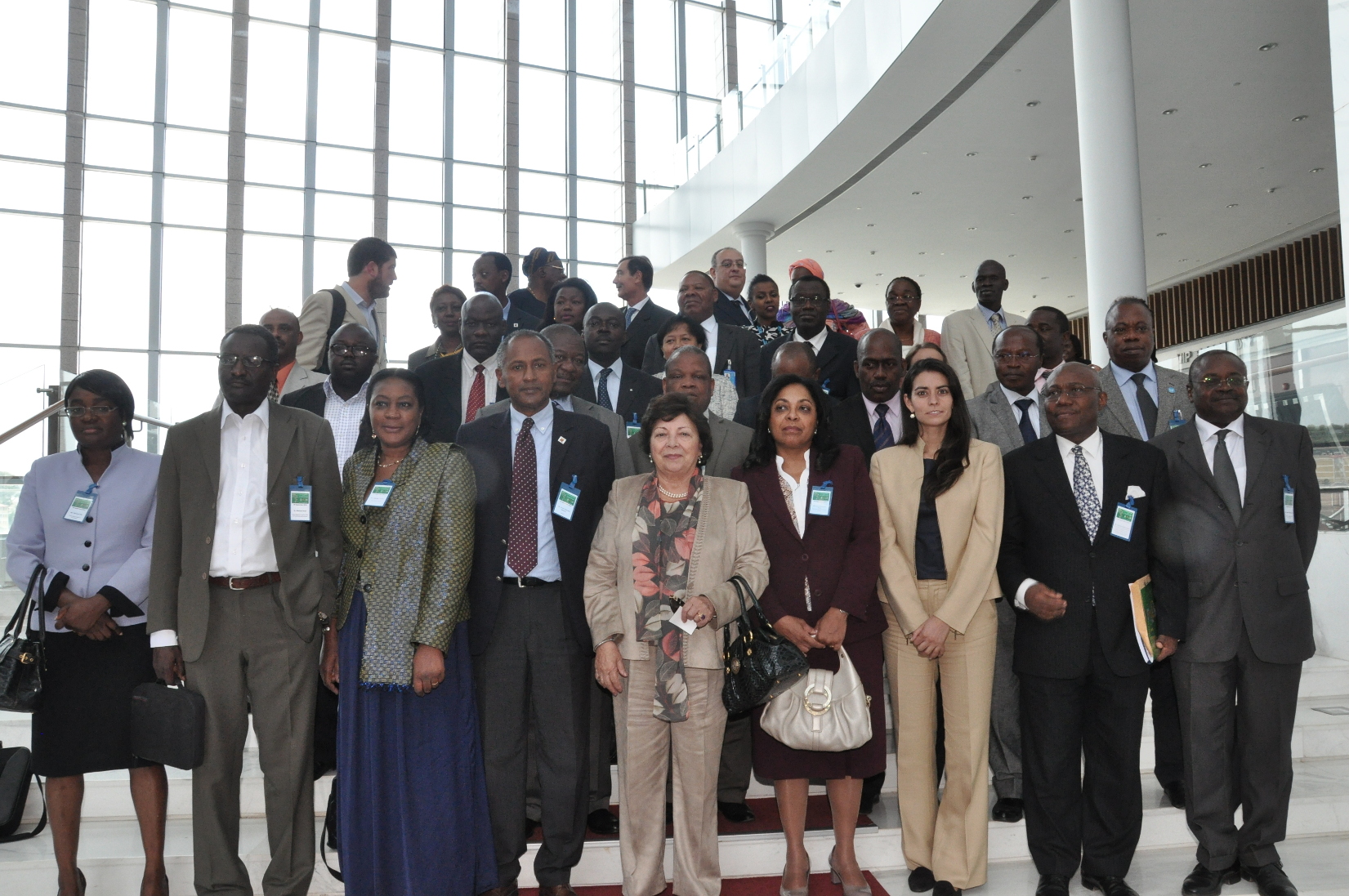
Links
FESA-UNESCO International Conference, December 12-13, 2016, Luena, Angola
Third Meeting of the Network September 11-12, 2015 in Soyo, Angola
Second Meeting of the Network, from September 21 to 24, 2014 in Yamoussoukro, Côte d'Ivoire
Network Creation Meeting on September 20, 2013 in Addis Ababa, Ethiopia
Text Resources
- Call for Papers HARIS 2 JUNE 2021
- Report of the 5th Meeting of Members of the Network held on 21 September 2019 in Angola on the sidelines of the Luanda 2019 Biennale for the Culture of Peace
- Activity Report 2019
- Program of the Luanda Biennale
- DRC the six-day war in Kisangani
- Insecurity in the Masisi in Eastern DR Congo
- General Report of the Houphouet Boigny Foundation International Conference, October 20, 2018
- RAPPORT FINAL DE LA CONFERENCE FESA-UNESCO SUR LE THEME "PREVENTION DES VIOLENCES ET PROMOTION DE LA CULTURE DE LA PAIX EN PERIODE ELECTORALE EN AFRIQUE" LES 12 ET 13 DECEMBRE 2016 A LUENA EN ANGOLA
- BULLETIN DE L’UNION AFRICAINE (UA) ET DE LA CORNE DE L’AFRIQUE (HOA) du 1er juin au 31 Août 2017
- LES STATUTS DU RÉSEAU
- RAPPORT D'ACTIVITÉS 2014 - 2015 DU RÉSEAU
- RAPPORT D'ACTIVITÉS 2015 - 2016 DU RÉSEAU
Welcoming Remarks
You are welcome to visit the website of the Network of Foundations and Research Institutions for the Promotion of a Culture of Peace in Africa.
The Network was created at the end of the Addis Ababa meeting on September 20 and 21, 2013 with a view to "creating a continental and sustainable peace movement capable of mobilizing African States, the private sector, African artists and leaders, international organizations and regional development actors as well as NGOs and grassroots associations". It is currently composed of 44 African and non-African organizations listed here.
You will find on our website articles, publications, photos and videos concerning the promotion of the Culture of Peace on the African continent. We also keep you informed about upcoming events.
